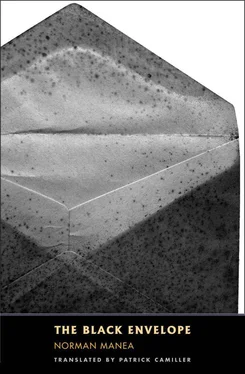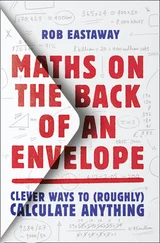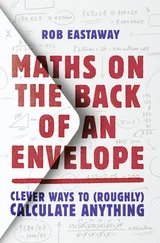“When I was young I also bravely marched in all kinds of columns. But I felt exiled in the end. One had the right to participate in evil, but not in the struggle against evil — what do you think? My work swallowed me up. Concrete, democratic suffering. There’s no truer school.”
But the telephone is ringing. Irina is in her room in one jump, hurrying to pick up the receiver.
“Hello. Ah, it’s you! Thank you, thank you very much. No, it’s not exactly a surprise. You’re as thoughtful as ever. It’s very nice. Yes, it was a cruel winter. A real cull, you’re right. Unheated houses, I know, the schools, libraries, and cinemas as well. And how did your wife cope? You’re right: yes, of course. No, you didn’t disturb me. Yes, I’m with some friends. Ah, I haven’t heard that joke before. Yes, the Jabberer’s one quality is that he inspires good new jokes every day!” and Irina laughs merrily. When she hangs up she has a troubled, confused air. Afraid because of what she has said, or because she lifted the receiver too quickly, or because the expectation proved false, or because the wasted evening is treacherously dragging on and stifling her.
She turns around to explain. “Mr. Gafton! To wish me all the best. He’s very thoughtful: he remembers every year.”
“So you know Mauriciu! Marcel! Matei! I didn’t realize that,” the doctor mumbles, bending over to wipe his glasses but also taking care that his artificial left eye is not visible.
“We haven’t seen each other for a long time. When they kicked him out of that national newspaper, they sent the poor man to work on the Association’s paper. He was on his last legs, with only a little time to go before he retired. We made friends. He’s a delicate man. He helped me quite a lot.”
“You see, Mr. Ianuli,” the doctor bursts out again, “this Marcel-Mauriciu is the best illustration. Coming from a very poor family, he studied day and night. Oho, what didn’t he study! Serving the great cause! Honestly adding his bit to the great hotchpotch. What do you say? And that business with the changing of his name! As you know, you can’t be a journalist in this country with some alien-sounding name. He took the name of his wife — the tainted and even dangerous name of a well-known family of legionaries. That was how he showed his courage, I ask you! How he, the victim, showed that there had to be an end to vengeance. By taking the name of the butcher. The silly man paid more than it was worth. Substitutions and substitutes, Mr. Ianuli. Is that world too picturesque, too interesting? Too boring in the end? Irina, did you know that Tolea lived at the Gaftons’?”
Irina pours some more wine into her glass. She does not answer: there is no need.
The doctor again turns in his chair to face Ianuli.
“I remember Tolea as a young man. A real dazzler, believe me. Serious and unaffected. Intelligent, polite, studious. You couldn’t even tell when the change— Well, it would have been worth being patient with him. I’ve said it before: he needed patience. He paid for it in the end. It’ll be hard for him to recover. It really wasn’t worth the price: it’s no joke. No, it’s no joke this time. But what I wanted to say, what I actually wanted to ask — yes, you’ve become really interested in linguistics. In the language of seclusion. And suspicion? What about suspicion?”
Ianuli feels uncomfortable and remains silent. But this time he smiles, passing his hands very slowly through his hair. He hopes the doctor might resume his monologue and allow him to avoid answering.
And of course that is what happens. However, Marga seems increasingly tired of the role he has taken on. His sentences no longer gush out but are like a stammering in the darkness that spreads into every corner of the room. “I’m not young any longer. I’m skeptical of utopias: I know what they bring. But doesn’t the collapse of great dreams spell disaster? Isn’t suspicion worse? Are rapaciousness and bigotry and cynical egotism becoming more and more justified?” And after a while: “Yes, I’m interested in the psychology of seclusion: it’s my obsession, yes.” And again at some point: “Do you think there’s something to be said for the isolation and impotence in which we are caught? Don’t underdevelopment and apathy also have advantages, perhaps? Just think of all the comfortable habits! Siesta, family relations, reading, home-cooked food, domestic order, politely behaved children, friends. In the modern world there’s no time for all that, is there? Whereas we hostages. .”
But Dr. Marga is already gone. At a certain moment he stands up and disappears. The night is rapidly closing in. They suddenly feel more alone, more joined in complicity.
“Come out on the terrace”—and her rough voice seems to grow warmer.
Clear, untouchable sky. Smooth silence, ice packs, darkness over which the moon’s sharp sickle is sliding.
Irina brings the bottle and glasses from inside and puts them on the cement, between the straw chairs.
“I didn’t know today was your birthday”—and the shadow makes a bow and raises its glass. The sky is smoking — a long gray cloud. Irina also takes a short sip. The sky is smoking — the barbaric, gigantic smoke of the night cloud, like a body tensed up to seize the prey, to relieve its long wait.
“This spring! Irinia bursts out. “It’s rotted our bones, hasn’t it? Even the change of season frightens us. That’s why I called you. When you are waiting all the time, you improvise solutions. Forgive me. And I’m sorry about Marga as well. He was in a bad mood, not his natural self at all — pathetically going on like that.”
Ianuli bends forward to take his glass just as Irina is finally putting hers down, having pointlessly held it in her hand for so long. She looks at him closely, without seeing him — watching for imperceptible, delayed animation, his incapacity to assume the burden. She turns, ready to arouse him, provoke him, bring him back to life.
“Some time ago — a month or more, I don’t remember — Comrade Orest Popescu, the head of the Association, read us all a sensational news item from some paper or other — I can’t remember which one. It was a strange report, of the kind that’s not usually allowed in our press. A woman had been attacked in her own apartment. Roughed up for no apparent reason. It’s true she had a dog and some cats, but that was hardly a convincing pretext. The article gave off special vibes — a sort of menacing hum. Or maybe it was only an impression I had. We’re not used to reading things like that in the papers. I began to realize the article was causing quite a stir. Lots of people were talking about it.”
She speaks without pausing for breath, then gulps down the contents of her glass. Quickly, inattentively. Her deep voice seems to wipe out the hesitations: it requires an answer, a confirmation. She needs someone’s voice and words, immediately, to give instant confirmation that the words really do exist, that this evening exists, that the terrace and the silences and the wine are real: words, headache, sky, death, everything.
“Well, yes, the text of the article seemed to condemn the attack. But its way of expressing itself was suspicious. So tough and vulgar and — complicitous. There seemed to be a complicity with the events, a profound affinity, even though it had the air of condemning them. The relationship between event and report showed that the rejection was only apparent. In reality there was a kind of complicity with what it rejected — with what it played at rejecting and combating. Will the real fighters ever come back to life? To clean out the filthy underground?”
Irina nervously stands up and lights a cigarette. Resting against the wooden balustrade, she looks with irritation at the combatant of days gone by.
Читать дальше












